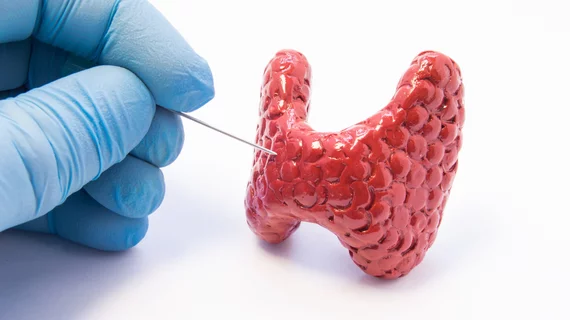'Surprising’ widespread variation in payer-negotiated thyroid imaging prices
A new study has unearthed “surprising” widespread variation in payer-negotiated prices for thyroid radiology care, Brigham and Women’s experts reported Friday in JAMA.
Among U.S. cancer centers, a neck CT scan could run anywhere from $108 to $4,845, while MRI ranged between $224 to $1,891. Many institutions included in the study also did not publicly share rates, as required by recent federal legislation, investigators noted.
“Reporting payer-negotiated prices is an important first step toward helping patients estimate the cost of care before receiving treatment,” lead author Roy Xiao, MD, an otolaryngology resident at the Brigham and Mass Eye and Ear specialty hospital, said in a statement. "Based on previous work, we expected to see some degree of variation, but the full range that we saw in our study was certainly surprising.”
Back in January, the Centers for Medicare & Medicaid Services began requiring hospitals to provide pricing information online to help consumers shop for healthcare services. Xiao and colleagues tapped this newly available data for their study, analyzing imaging and other care delivered at 52 designated cancer centers across the U.S. Researchers targeted 14 services that are crucial to thyroid cancer management, including radiology studies, surgical treatments and lab tests.
Only 50% of cancer centers divulged commercial payer-negotiated prices for services on their websites, Xiao et al. noted. Disclosure differed depending on the service, with more than 48% of centers sharing pricing for neck ultrasound while 15% reported professional fees for a total thyroidectomy.
Even when adjusting for other factors that affect the cost of care, Xiao et al. still found wide pricing variation across different cancer centers. That included a more than 12-fold difference in the cost of a neck ultrasound (with a raw median price range of $82-$939); nearly 18-fold for a whole-body thyroid scan ($248-$3,735); 21-fold for a thyroid uptake scan ($56-$1,165); 24-fold for neck MRI ($224-$5,130); and nearly 45-fold for neck CT ($108-$4,845). Pricing also varied within each cancer center. A thyroid uptake scan, for instance, could cost nearly five times as much in the same institution, depending on the patient’s insurer.
Researchers chose thyroid cancer for their study because it is one of the most common malignancies in the U.S., with well-established treatment regimens. Costs, however, can vary substantially and impose “significant” financial burdens, with high bankruptcy rates among thyroid cancer patients, the authors noted.
You can read the rest of their research letter, published June 4 in JAMA, here.

